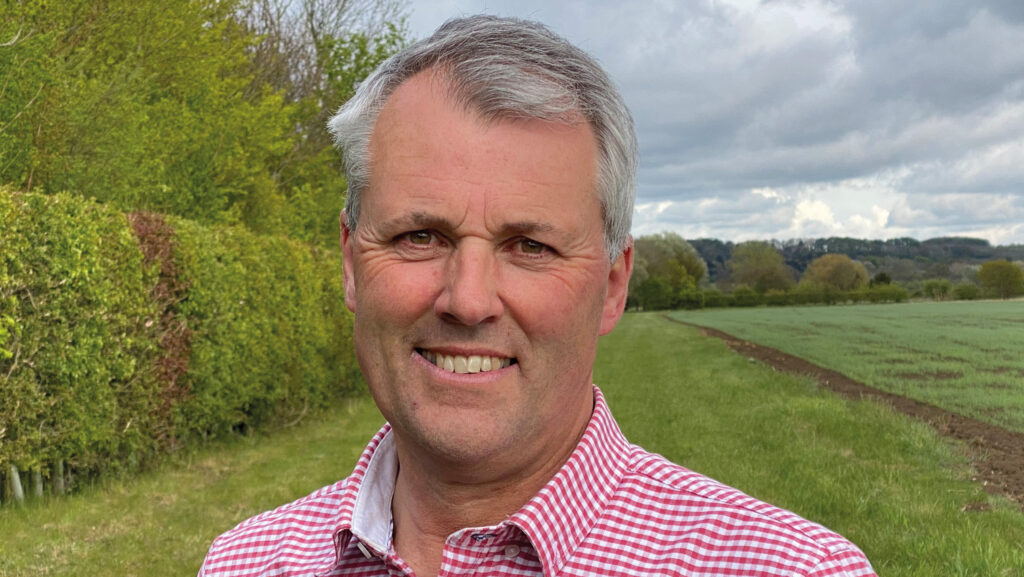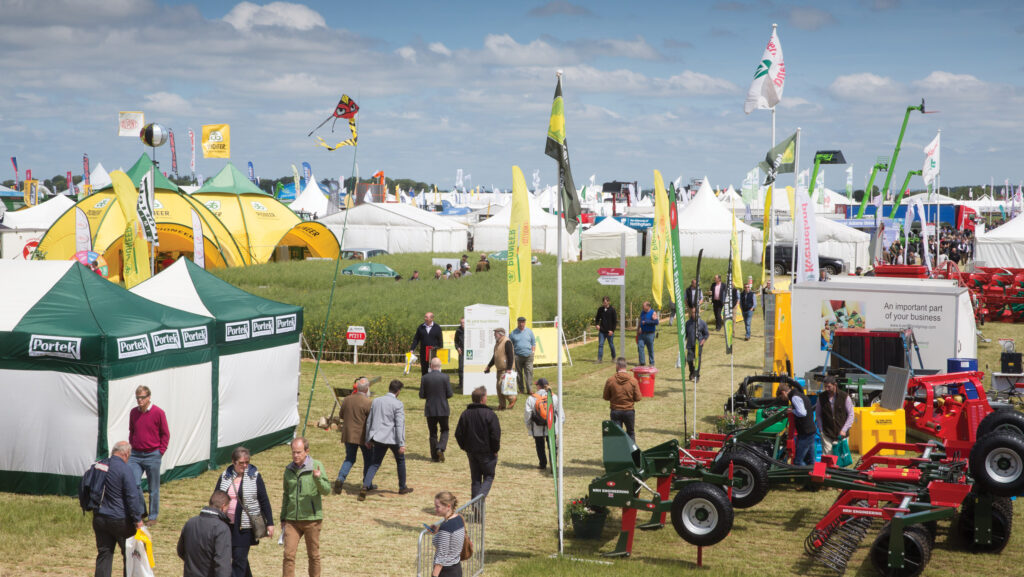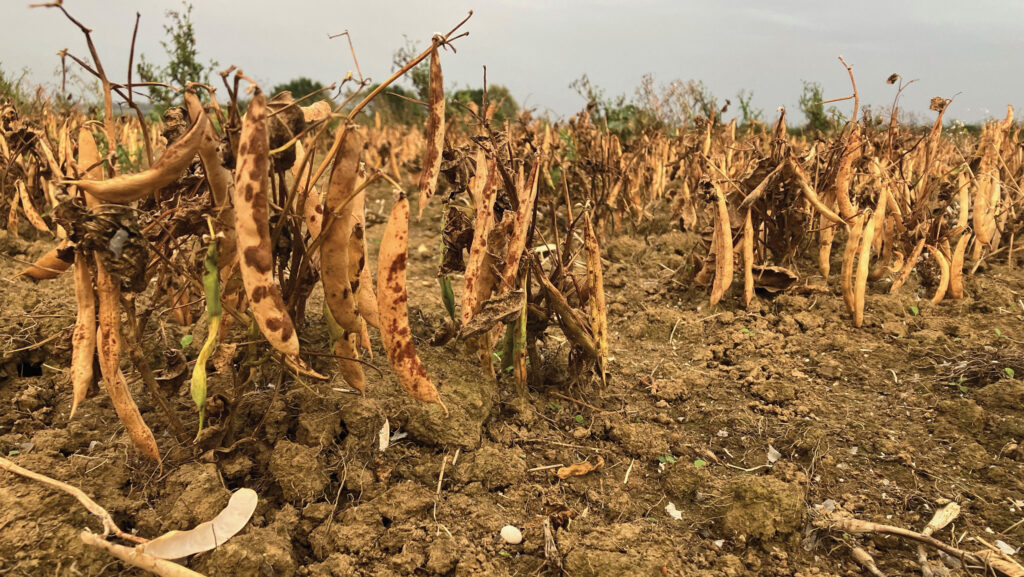Cereals 2025 host Andrew Ward reflects on farming changes
 Andrew Ward © Andrew Ward
Andrew Ward © Andrew Ward Andrew Ward is a familiar face to many, having been involved in several farming initiatives over the years.
One of the organisers of the post-Budget farming rally in Westminster, Andrew also founded Forage Aid and has his own YouTube channel, Wardy’s Waffle, in which he highlights farming and countryside issues.
Not one to shy away from confronting politicians and voicing his concerns about the industry’s future, he also runs a 660ha arable farm from his base at Leadenham in Lincolnshire.
See also: Why parasitic weeds are a rising arable threat
A mix of owned, tenanted and contract farmed land, it encompasses both heavy clay and light heathland soils, with combinable crops and sugar beet grown. Not surprisingly, Cereals 25 is being held on the light land, where it also took place in 2004 and 2008.
Currently, the business has two Sustainable Farming Incentive (SFI) agreements up and running, and a Mid Tier Countryside Stewardship scheme.
“We’ve been involved in stewardship since 2005,” recalls Andrew. “It’s an integral part of the farm. It works well alongside food production and we have the biodiversity to prove it.”
With the current SFI impasse, what happens when his current schemes come to an end is anyone’s guess, he acknowledges.

© Tim Scrivener
Belt tightening
Andrew last hosted Cereals in 2008 – the year set-aside was abolished and commodity prices shot up in reaction to the financial crisis triggered by American subprime mortgages and lack of regulatory oversight.
“That was when things were really buoyant in farming and Cereals had a record attendance of 27,000,” he recalls. “This year, it couldn’t be more different. We’re all looking at some serious belt tightening.”
With the government putting most of its funding for both food production and nature recovery on hold, making investment decisions or plans is almost impossible.
“Many farmers are questioning whether it’s worth continuing and what they are getting out of bed for,” he says. “The arable industry has been shell-shocked by recent events.”
It’s not just the lack of profit that is occupying farmers’ minds. Inheritance tax changes, red tape, imports, legislation and labelling are all on the agenda, as is the need for diversification.
“Diversification shouldn’t have to be an option when you’re set up as a productive food business,” he believes. “If we could make money from producing the nation’s food, it wouldn’t be up for discussion. But as things are, we all have to look at it.”
Agronomic challenges
On his own farm, there have been changes over the years in order to overcome agronomic challenges, bring down costs and keep moving forward. Being an Agrii iFarm for several years allowed Andrew to conduct costed trials and compare management practices, before making key decisions.
One of the changes is that oilseed rape hasn’t been part of the rotation since 2019. “Like many others, we’ve stopped growing it for now,” he says. “The risks were outweighing the rewards, despite good demand for the crop.”
Winter wheat, spring malting barley, beans and sugar beet are produced, with oats featuring in some years. The rotation varies according to soil type and has evolved as blackgrass numbers have come down – something Andrew has a laser focus on.
A traffic light cropping system helped with this – with the worst “red light” fields put into continuous spring barley until the weed burden came down.
“It took 11 years to get blackgrass down to manageable levels. Fields were put into one of three categories, depending on grassweed pressure, with the rotation varied accordingly. We even sprayed patches of wheat off to prevent seed return.”
As a result, he has reduced herbicide use by 32% without having to plough. “We stopped ploughing back in 2004. Today, we are spending £58/ha on herbicides in winter wheat and £28/ha on hand rogueing, making a total of £86/ha. In spring barley, it’s £68/ha.”
Cultivations costs
The old cultivations system based on ploughing was costing £144/ha on his heavy soils. It was also very time-intensive. Switching to min-till with a Simba Solo and a Simba Freeflow drill reduced this cost to £96/ha.
Tracked machines have always featured at the farm, with the first Quadtrac arriving in 2009. However, as machine weight and working width increased, fuel use went up.
“We changed to a John Deere 8RX which meant we lost 9t of weight, while fuel use came down from 17 litres/ha to 8 litres/ha drilling with the 8m Simba Freeflow. It gave us considerable savings,” he says.
A one-pass system for establishing oilseed rape was devised in the workshop in 2013, by adapting a 6m Simba Solo. “It’s now being used to establish cover crops and works very well.”
No-till and direct drilling have been given a comprehensive test on the farm, with seven years of trials conducted on the heavy soils with cover crops and direct drilling of spring barley, wheat and oilseed rape.
“We just lost money,” says Andrew. “We compared the system to our farm standard, over some very different seasons, and the results were clear.”
Yields were lower where direct drilling was used, as were returns. The farm standard gave an average spring barley yield of 7.79t/ha, while the cover crops and direct drilling yield was 6.08t/ha.
“Over seven years, the average loss was £181/ha. In 2022, when it was wet, that deficit went up to £550/ha.”
Weather effects
Another learning from the following very wet year is that late drilled spring crops don’t work on the farm. “By late, I mean not after April 20,” says Andrew.
For harvest 2024, after incessant rain, he had one third of the farm uncropped. “I took the decision to abandon any thoughts of drilling spring crops, used a summer cover crop instead and set about doing drainage.”
The cover crop was rolled, at a cost of £12/ha, before the Simba Solo was used on an angle to help with destruction. It was then sprayed off and drilled with wheat at the end of September. “Hopefully we are back on track now,” he says.
British baked beans

Capulet spring beans © MAG/Emma Gillbard
Andrew has been working closely with the University of Warwick developing a spring bean variety called Capulet, which are the first British-bred variety used for baked beans.
Drilled in May and ready for harvest just 100 days later, it is still early days but has good potential for UK farms.
Two other varieties, Godiva and Olivia, are also being trialled on the farm.
Why should farmers attend Cereals 2025?
After a difficult few months, farmers should take the time to attend Cereals this year, believes host farmer Andrew Ward. “It’s the place to get new ideas and talk to experts,” says Andrew Ward. “If that doesn’t appeal at, come along for a change of scene and see your friends.”
Networking and talking to others in the same boat can go a long way to making you feel better. “We all know about the levels of stress and anxiety in farming right now and this event is well-timed to help.”
Andrew is extending an invitation to everyone to visit Wardy’s Waffle bar, which will have a prominent place on the side of the main walkway which runs through the middle of the showground, and will be situated alongside a dedicated Young Farmers area.
